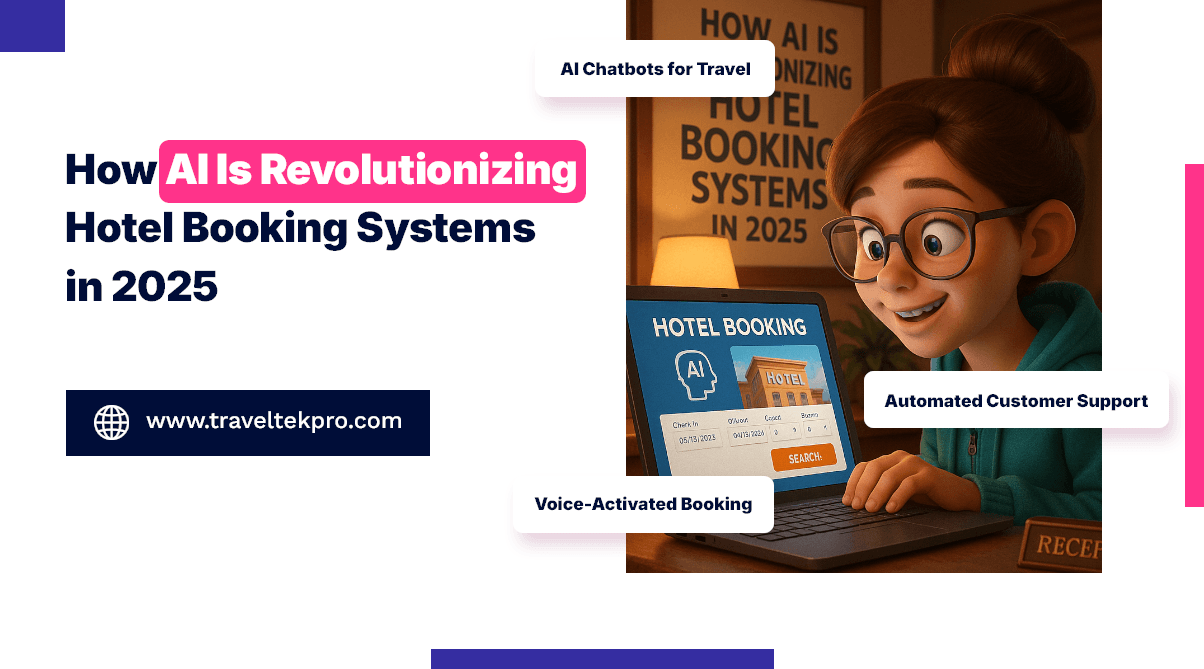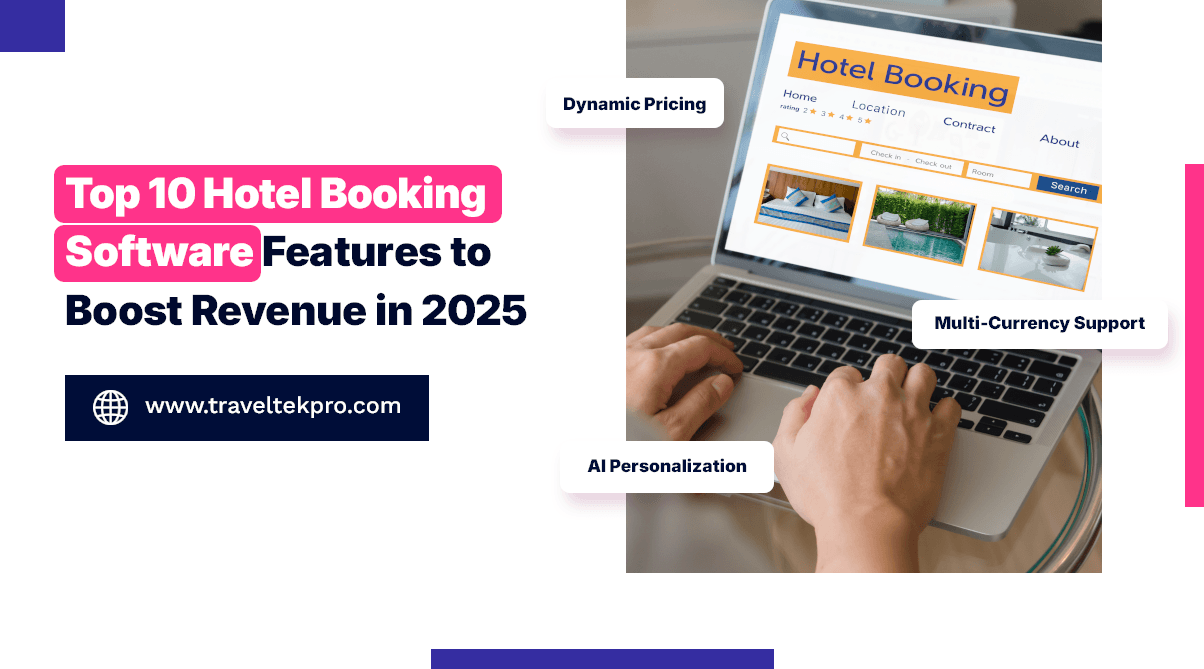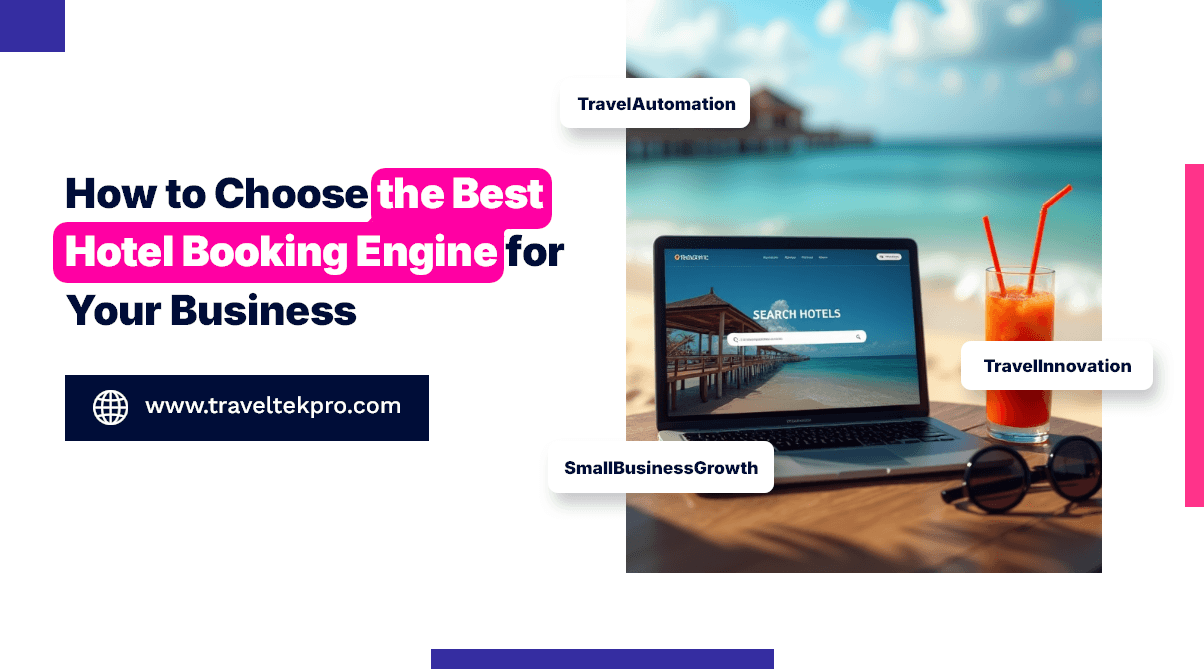How AI Is Revolutionizing Hotel Booking Systems in 2025
Let’s face it travel has completely changed and hotel booking? It’s not just finding a bed for your night. In 2025 it’s all about smart recommendation real time availability and instant confirmations beside customized experiences. Your guest today wants ease, speed and that extra wow factor without needing to talk to any human unless they want to. That’s where artificial intelligence comes in the picture.
AI goes way beyond then just a tech buzzword anymore. It’s actually the backbone of modern hotel booking systems quietly working behind the scenes to improve the experience for both hoteliers like you and guests. Whether you are a hotel owner or property manager or just someone working in hospitality tech the shift matters. If you really want to stay competitive, profitable and relevant, embracing AI is truly no longer optional, especially with your hotel booking engine.
The current state of hotel booking systems
Back in the day hotel bookings were mostly made by travel agents phone calls or through walkins. Then came the Internet and websites like booking.com changed the entire game. Today in 2025 things have taken another leap thanks to AI powered Hotel Booking Systems . Today the hotel booking systems are completely automated and intelligent. They go way beyond just tools for checking room availability; they are actually full scale platforms that show dynamic rates sync across multiple channels and offer direct bookings options.
These systems can also connect with property management systems and help you manage revenue inventory and even guest communications. Most importantly they use AI to understand guest behavior, predict demand and customize offers. This creates a smooth data-driven booking experience that your guests will love and as a hotel you can benefit from it.
Read More: Why Your Travel Business Needs a Hotel Booking System in 2025
AI powered booking engines what’s changing?
The old systems could only do what you had told them to. AI powered systems on the flip side learn as they go. They adapt, evolve and even make smart decisions based on data.
1. Customized search results
AI looks at your past search preferences depending on patterns and even booking behaviour. If you always prefer sea views and king size beds the engine shows those options firstly.
2. Pricing
Forget static room rates. AI adjusts prices in real time based on demand season and competitive pricing and of course local events. This means you earn more and your guests can still get fair prices.
3. Smart recommendations
AI doesn’t just help with one room selection it recommends meal plans, spa treatments and late checkouts besides local experiences that match your guests interests.
4. Instant support via AI chatbots
Your guests expect instant answers. With AI powered chatbots they ask questions, modify bookings and get support 24/7 even without waiting for staff.
5. Automated fraud detection
AI systems can help you track booking behavior and flag anything that looks suspicious. That means there will be minimum chargebacks and a lot of peace of mind.
6. Seamless mobile experiences
People today book on the go. AI helps you optimize mobile layouts, load faster pages and suggest shortcuts that lead to better conversion rates.
In short , AI is making hotel booking really smart, faster and more human friendly even without a human behind the screen.
Key benefits of AI integration in hotel booking software
Now you might be wondering how does all this actually help your hotel
Higher revenue through smart pricing
AI allows you to automatically update prices based on the demand. When there is a big event in town the system will raise prices to match the market demand and there is no manual input required.
Increase direct bookings
AI powered Hotel Booking Software makes hotel websites more engaging and very easy to use. This helps you drive direct bookings which means there are no third party Commission fees.
Better guest experience
When your guests options faster support and relevant offers they are more likely to book and return. AI makes your guests feel understood.
Reduced operational load
From sending confirmation emails to updating availability, AI handles all the routine stuff for you. It frees up the hotel staff to just focus on delivering amazing hospitality.
Smarter decision making
AI dashboards show information on booking trends occupancy rates revenue and guest feedback. Hotel managers can help you make informed decisions quickly.
The minimum errors
Automation means fewer double bookings, pricing mistakes or even overbookings. It helps you save a lot of time, money and guest frustration.
Read More: 7 Benefits of Using a Modern Hotel Booking System in 2025?
Competitive landscape
AI in hospitality is growing rapidly and several companies are truly leading the charge with innovative solutions.
1. Traveltekpro
It is known for its fully AI integrated hotel booking system. They offer smart search, dynamic pricing and easy integration with PMS and payment gateways. The focus is on scalable future proof solutions for small and large hotel brands.
2. Cloudbeds
It combines PMS booking engines channel managers with AI tools. The all-in-one platform helps you manage everything from bookings to revenue and communication.
3. SiteMinder
With AI powered distribution tools the platform helps you manage rates and availability across multiple channels while keeping direct bookings as a top priority.
4. Oracle Hospitality
The company is heavily investing in AI to streamline hotel operations and support hyper customized guest journeys. So here you can expect the best hotel booking engine.
5. Sabre Hospitality solutions
The company is pushing forward with AI for customized guest experiences, real time data analytics and integration with voice enabled Hotel Booking System.
Some of the main market trends in 2025.
1. AI powered voice search is becoming a common booking method.
2. Chatbots are now standard on all hotel websites and apps.
3. Many hotels today are moving away from OTAs to just focus on direct revenue.
4. Sustainability and eco conscious travel are driving new booking preferences that AI can easily track.
Why must hotels embrace AI powered Hotel Booking Software?
- Let’s be real, change can be unforgettable. But in 2025 not changing is completely risky. If your hotel is still relying on outdated systems or basic working software you are truly missing out on guests revenue and efficiency.
- People today are used to Netflix and Amazon recommending things they love. They expect the same from hotel booking. If your system shows generic results it’s not meeting modern expectations.
- AI helps you adjust prices in seconds. If your competitor is using dynamic pricing you are not truly losing money.
- Manually handling bookings, sending emails or adjusting rates takes a lot of time. AI does it all in just minutes and that is better.
- Why pay 15 to 30% Commission to OTAs when you get direct bookings through your own AI optimized engine?
- AI can monitor reviews in real time, notify about issues and events and suggest how to respond. That helps you maintain a great online reputation.
- Hotels that delay upgrading the systems risk being left behind and guests? They are going to book where the process is completely fast, smart and most rewarding.
How is Traveltekpro driving smart booking revaluation?
- Among the companies leading the AI transformation, Traveltekpro truly stands out because the system understands what guests are looking for even before they finish typing. It provides you suggestions based on preferences, travel trends and real time based availability.
- Rooms pricing add-ons updates across your website mobile app and much more all are in sync.
- Your guests can ask questions and get instant support events booked directly through chatbot on your site or app 24/7.
- Would you offer a spa package to guests who booked two nights or more? Well the system automatically suggests upsells to the right people.
- As a hotel manager you can get access to smart analytics that show performance revenue trends and actionable insights.
So above all you need to know that AI is not here to replace the human touch and possibility but it’s here to improve it. It’s here to make the booking process smooth for your guests and easier for your hotel team. In 2025 the most successful hotels are those that are data-driven guest focused and tech savvy. If you are still using a basic system it’s time for you to level up. Embrace the power of AI. Customize the experience and make smarter pricing decisions. The future of hotel booking is here.
FAQ’S:
1. How is AI transforming the hotel booking experience in 2025?
AI is fundamentally changing hotel booking by making it smarter, faster, and more personalized for both guests and hoteliers. In 2025, AI-driven systems analyze guest preferences, booking behaviors, and real-time data to deliver customized search results, dynamic pricing, and instant confirmations. These systems can recommend tailored experiences—such as room upgrades, spa treatments, or local activities—based on individual guest profiles. For hoteliers, AI streamlines operations, automates routine tasks, and provides valuable insights through analytics, allowing for better decision-making and improved guest satisfaction. The result is a seamless, data-driven booking journey that feels intuitive and engaging, even without direct human interaction.
2. What are the key benefits of integrating AI into hotel booking software?
Integrating AI into hotel booking software brings a host of benefits that directly impact revenue, guest satisfaction, and operational efficiency. AI enables dynamic pricing, automatically adjusting room rates based on demand, seasonality, and local events, which maximizes revenue potential. It also enhances the guest experience by offering personalized recommendations and 24/7 support through chatbots. For hoteliers, AI reduces manual workload by automating tasks such as sending confirmation emails, updating availability, and detecting fraudulent bookings. Additionally, AI-powered dashboards provide actionable insights into booking trends and guest feedback, helping managers make smarter, faster decisions. Overall, AI integration leads to fewer errors, higher direct bookings, and a more competitive business.
3. How do AI-powered booking engines differ from traditional hotel booking systems?
AI-powered booking engines are a significant leap forward from traditional systems, which typically relied on static data and manual updates. Unlike their predecessors, AI-driven engines learn from guest interactions, adapt to changing market conditions, and make data-backed decisions in real time. They offer dynamic pricing, personalized search results, and smart recommendations for upsells or add-ons, all tailored to individual guest preferences. AI booking engines also integrate seamlessly with property management systems, channel managers, and payment gateways, ensuring a unified and efficient workflow. This level of automation and intelligence not only enhances the guest experience but also boosts operational efficiency and profitability for hotels.
4. What are some of the latest trends in hotel booking technology for 2025?
In 2025, several key trends are shaping the future of hotel booking technology. AI-powered voice search is becoming a popular method for making reservations, allowing guests to book rooms using natural language commands. Chatbots have become standard on hotel websites and apps, providing instant support and assistance around the clock. There is a growing shift toward direct bookings, as hotels aim to reduce reliance on third-party Online Travel Agencies (OTAs) and increase profit margins. Sustainability and eco-conscious travel are also influencing booking preferences, with AI tracking and responding to these trends. Additionally, mobile-first experiences are prioritized, with AI optimizing layouts and functionality for on-the-go users.
5. Why is it crucial for hotels to adopt AI-powered booking software now?
Adopting AI-powered booking software is no longer optional but essential for hotels that want to stay competitive and relevant in 2025. Guests today expect the same level of personalization and convenience they experience with platforms like Netflix and Amazon. If a hotel’s booking system offers generic results or slow responses, it risks losing business to more tech-savvy competitors. AI enables hotels to react instantly to market changes, optimize pricing, and automate repetitive tasks, freeing staff to focus on delivering exceptional hospitality. Furthermore, direct bookings through AI-optimized engines help hotels avoid hefty OTA commissions, while real-time reputation management tools ensure a positive online presence. Delaying AI adoption means risking lost revenue, lower guest satisfaction, and falling behind industry leaders.
6. Which companies are leading the AI revolution in hotel booking systems, and what sets them apart?
Several innovative companies are at the forefront of the AI revolution in hotel booking systems. Traveltekpro stands out for its fully integrated AI platform, offering smart search, dynamic pricing, and seamless integration with property management and payment systems. Cloudbeds provides an all-in-one solution combining booking engines, channel management, and AI-driven tools for comprehensive hotel operations. SiteMinder leverages AI for distribution, helping hotels manage rates and availability across multiple channels while prioritizing direct bookings. Oracle Hospitality is investing heavily in AI to deliver hyper-customized guest experiences and streamlined operations. Sabre Hospitality Solutions focuses on real-time analytics, voice-enabled bookings, and personalized guest journeys. These companies differentiate themselves by offering scalable, future-proof solutions that cater to both small independent hotels and large global brands.
Let's Start Your Project
Let us help you achieve your goals, by creating the best solution for you!




